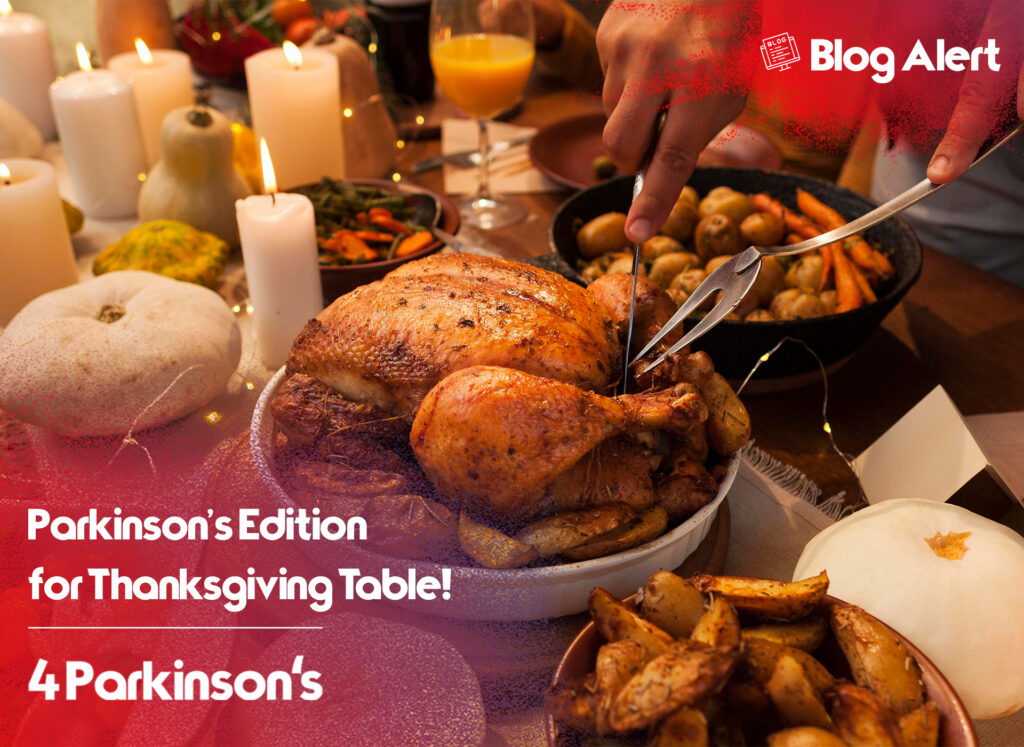
At 3 p.m., you've recently indulged in a Thanksgiving turkey feast. How are your Parkinson's indicators? Experiencing a greater sense of deceleration? Observing heightened tremors? Sensing increased rigidity? It could be more than just the tryptophan (found in the turkey) influencing you.

While there isn't a singular diet that can cure Parkinson's disease, it's important to note that medication may necessitate adjustments in your mealtime routine. Additionally, making dietary changes could potentially alleviate specific symptoms. Consulting with your physician or a registered dietitian can result in a tailored, wholesome diet that aligns with your requirements and enhances your overall health. Although there's no universally prescribed dietary approach for people with Parkinson's disease, a well-rounded diet rich in fruits and vegetables contributes to the well-being and vitality of everyone.
If you have Parkinson's and find that your medications are effectively managing your symptoms after meals, you likely don't need to worry. However, if you observe that following meals, particularly those high in protein, your medications appear to be less effective, it might be worth considering some dietary adjustments.
The substantial neutral amino acids found in protein-rich sources (such as turkey) can vie for the transport of levodopa from the stomach into the bloodstream and from the bloodstream into the brain. Levodopa constitutes the fundamental medication employed in the advanced stages of Parkinson's disease. Within the brain, it converts into dopamine, the principal neurotransmitter lacking in individuals with Parkinson's.
One effective approach is to restructure your meals by prioritising protein-rich foods like beef, poultry, fish, dairy, eggs, and legumes for your evening meals. Reserve morning and afternoon meals for grains (such as bread, pasta, and rice), vegetables, and fruits. This adjustment is likely to improve your Parkinson's symptoms, including tremors, stiffness, and slowness, particularly in the mornings and afternoons. You might experience a slight decrease in pace or notice an uptick in tremors in the evening; however, this period is often characterised by lower activity levels.
Dr. Amie Peterson, Assistant Professor of Neurology at OHSU Parkinson Center of Oregon, suggests, “You may want to eat your Thanksgiving meal a bit later this year or skip the turkey if you have an early meal. You may also want to indulge — slowing down a bit to watch football may not be such a bad fate.”
“Expressing gratitude for the miracles in your world is one of the best ways to make each moment of your life special. Happy Thanksgiving to you and your loved ones!” Wayne Dyer
Now, let's take a look at ten things that Parkinson's blogger Sharon Krischer, known as 'Twitchy Woman,' is grateful for and shares while living with Parkinson's disease in honour of Thanksgiving. Let's join in her sentiments.
10. Getting by on little sleep gives us much more time to play games on our iPads in the middle of the night while we are deluding ourselves into thinking that these games may help our brain cells regenerate.
9. We can blame our obsessive/compulsive behaviours (see #10) on our medications, and the non-Parkies will believe us.
8. Waking up at 5:00 am doesn’t seem so early anymore. But why am I always late to my 8:30 a.m. yoga class? (See #10. I still play those stupid games on my iPad.)
7. I can do things with my left hand now that I wouldn’t have been able to do if that damn tremor in my right hand didn’t act up while trying to do something like eating, writing, or brushing my hair.
6. Living with Parkinson’s has taught me to be more proactive about my health. I keep up with the latest research and always go to my doctor with a list of questions and concerns.
5. All of the new friends that I’ve made who also have Parkinson’s. We can laugh and cry together about things that non-Parkies would never understand.
4. Fortunately, I have a slowly progressing form of Parkinson’s, which is controlled by meds. Better living through Chemistry is my mantra.
3. Laughing with Parkinson’s – when all else fails, I can always blame stupid things I do on that @$#!% tremor!
2. Loving with Parkinson’s means cherishing the life my husband and I have together and making adjustments as we need to when that @$#!% tremor gets in the way again.
1. Living with Parkinson’s has enabled me to reach out to others like you, hopefully making all of our lives just a little bit better.
Stay healthy, be safe, and don’t ever give up!
Happy Thanksgiving.
Join our community in spreading hope and strength. Tell us your unique journey with Parkinson's to uplift and empower others.